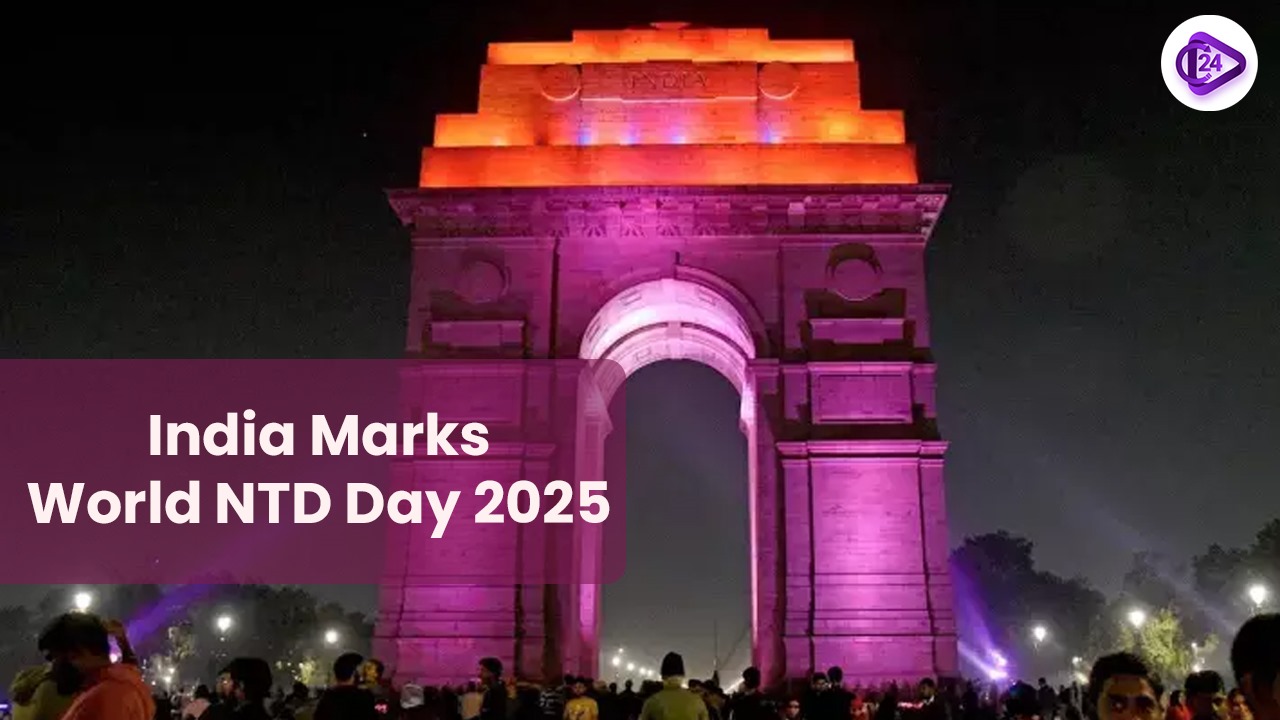Daily Quizzes
Mock Tests
No tests attempted yet.
Select Category

The National Observance of World Neglected Tropical Diseases (NTD) Day 2025 featured India Gate as an awareness-raising landmark that used purple and orange illumination to discuss Neglected Tropical Diseases (NTDs). The communal effort together with government policy achievements demonstrated India's success in controlling Lymphatic Filariasis and Visceral Leishmaniasis, which affect over 1.7 Billion people globally, it is often neglected in global discussions despite affecting several people and causing severe health issues.
What are Neglected Tropical Diseases (NTDs)?
Definition
The group of infectious diseases named NTDs mostly targets poor communities existing within tropical and subtropical locations. These diseases remain outside the scope of most international health plans and receive inadequate funding support.
Prevalence:
NTDs exist as a global health problem that impacts more than 1.7 billion people specifically within areas with restricted healthcare access including low-income nations.
Types of NTDs
-
Some common NTDs include:
-
The parasitic infection Lymphatic Filariasis brings about severe leg swelling which produces permanent disability for patients.
-
The deadly infection of Visceral Leishmaniasis attacks the internal body organs with the main impact on the spleen and liver.
-
Other diseases like Schistosomiasis, Trachoma, Guinea Worm Disease, and Soil-transmitted helminths.
-
Impact of NTDs
Due to their nature NTDs bring about extreme disability and permanent health disabilities and damaging physical deformities. NTDs cause affected individuals to experience social exclusion which worsens due to stigma.
Neglect:
NTDs receive minor attention from global health institutions so they qualify as neglected diseases even though they affect numerous populations. NTDs remain hidden beneath the international health schedule due to more prominent diseases taking precedence.
Solutions for NTDs
-
Mass Drug Administration (MDA):
-
NTD reduction through mass treatment programs becomes possible when medication is offered to all community members residing in areas with high risk.
-
-
Community Engagement:
-
The success of NTD control programs depends on public participation since community members need proper education for disease prevention methods and available treatments.
-
-
Improved Sanitation:
-
Sanitation and hygiene improvement measures stop numerous NTDs from spreading since they reduce soil contamination which acts as an NTD transmission mechanism.
-
India's Progress in Eliminating NTDs
-
Substantial progress regarding negligent tropical diseases has occurred in India, especially after its successful elimination of Lymphatic Filariasis and Visceral Leishmaniasis.
-
Human involvement as well as government programs through mass medication have enabled India to reduce these diseases substantially.
Conclusion
The celebration of World NTD Day 2025 brought attention to how institutions still fight against neglected tropical diseases. The nighttime illumination of India Gate with purple and orange light demonstrated India's resolve to spread awareness and solve the health and social problems resulting from NTDs. With community engagement, policy actions, and improved healthcare systems India is making progress toward eliminating these diseases and making progress of better health in the nation.



 Uday Kotak Appointed New Chairman of GIFT City, Replaces Hasmukh Adhia
Uday Kotak Appointed New Chairman of GIFT City, Replaces Hasmukh Adhia Delhi Govt Launches Lakhpati Bitiya Yojana for Girl Children
Delhi Govt Launches Lakhpati Bitiya Yojana for Girl Children Wool production in India
Wool production in India Renowned Sociologist Andre Beteille Dies In Delhi at 91
Renowned Sociologist Andre Beteille Dies In Delhi at 91 Bharat Taxi: India’s First Cooperative Cab Service To Be Launched Today
Bharat Taxi: India’s First Cooperative Cab Service To Be Launched Today 5th edition of Rüsoma Orange Festival begins in Nagaland
5th edition of Rüsoma Orange Festival begins in Nagaland Indian Railways Launches First-Ever LNG-Diesel Dual-Fuel DEMU Train in Ahmedabad
Indian Railways Launches First-Ever LNG-Diesel Dual-Fuel DEMU Train in Ahmedabad Dhamtari Becomes First District in Country to Collect Property Tax via SAMARTH Portal
Dhamtari Becomes First District in Country to Collect Property Tax via SAMARTH Portal Neolithic Relics Found at Lakkundi Excavation in Karnataka
Neolithic Relics Found at Lakkundi Excavation in Karnataka Lucknow Leads as UP’s First Zero Fresh Waste Dump City
Lucknow Leads as UP’s First Zero Fresh Waste Dump City






